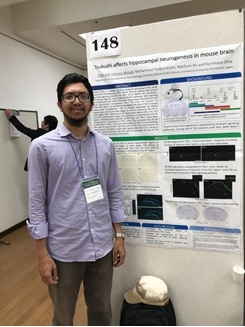
Shah Adil Ishtiyaq Ahmad, Mohammad Badrul Anam, Naofumi Ito and Kunimasa Ohta
Department of Developmental Neurobiology, Graduate School of Life Sciences, Kumamoto University, 1-1-1 Honjo, Kumamoto, Japan.
Name of the academic meeting: Joint Annual Meeting of JSDB 51st and JSCB 70th, Tower Hall Funabori, Tokyo, Japan (June 5-8, 2018).
Date of presentation: 2018-06-06
Type of presentation: Poster presentation
Poster Number: P1-148
Discussion Times: 15:00-16:00
Abstract
Tsukushi (TSK) is a soluble signaling molecule belonging to the Small Leucine-Rich Proteoglycan (SLRP) family. TSK interacts with several important signaling cascades like Wnt, TGF-, BMP, FGF and Notch, and thereby regulates various developmental processes (Ahmad et al. 2018). Hippocampal neurogenesis is regulated by multiple signaling pathways, like Wnt, BMP, Notch, Shh, GABA etc (Goncalves et al. 2016). Since TSK directly interacts with BMP, Wnt and Notch pathways, we decided to investigate the role of TSK in mouse hippocampal neurogenesis. At first, we checked the expression of TSK in mouse hippocampus at different developmental stages. TSK is strongly expressed at hippocampal regions during early developmental stages starting as early as embryonic day 18. Along with the development, TSK expression declines. In early stages, TSK is expressed in all the hippocampal regions (DG, CA1, CA2 and CA3), while at postnatal day 30, the expression is restricted to only DG region. Following BrdU injection of wild type and TSK-/- mice, BrdU incorporation is increased in the TSK-/- mice. The increased rate of cell proliferation in the TSK-/- mice is also evident by the immunostaining for Ki67, which suggests possible regulatory role of TSK in the maintenance of hippocampal neurogenic niche. We will do further analysis to clarify the role of TSK in hippocampal neurogenesis with special attention to its influence on different signaling cascades. We also want to investigate the role of TSK in behavior and memory formation.
In the meeting, I discussed my work with many researchers from around the world. I received useful comments from many experienced researchers. I also attended the lectures of many famous scientists which were very inspiring. I thank ‘International Research Core for Stem Cell-based Developmental Medicine’ project for supporting my expenses to attend the meeting.
